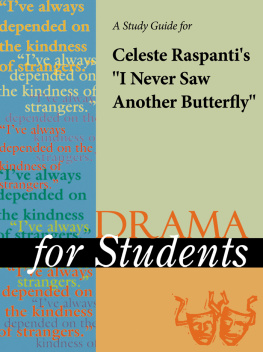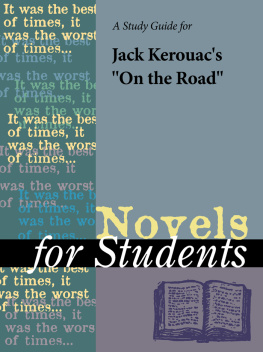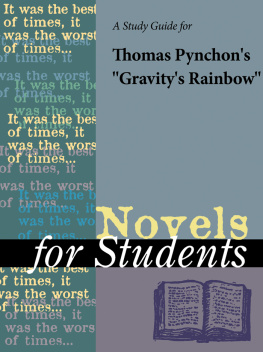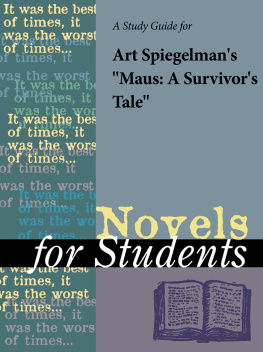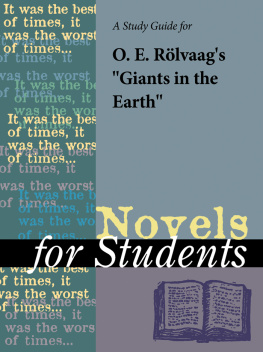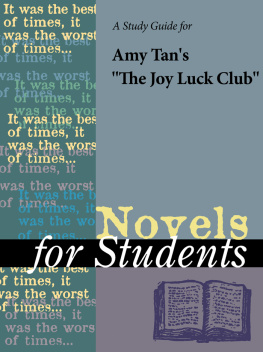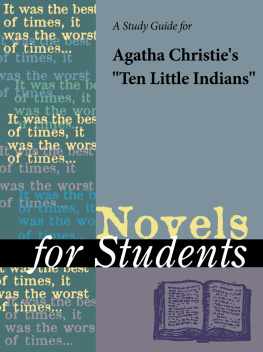TABLE OF CONTENTS
Guide
Novels for Students, Volume 17
Project Editor: David Galens
Editorial: Anne Marie Hacht, Ira Mark Milne, Pam Revitzer, Kathy Sauer, Timothy J. Sisler, Jennifer Smith, Carol Ullmann, Maikue Vang
Research: Nicodemus Ford, Sarah Genik, Tamara Nott
Permissions: Shalice Shah-Caldwell
Manufacturing: Stacy Melson
Imaging and Multimedia: Dean Dauphinais, Leitha Etheridge-Sims, Mary Grimes, Lezlie Light, Luke Rademacher
Product Design: Pamela A. E. Galbreath, Michael Logusz
2003 by Gale. Gale is an imprint of The Gale group, Inc., a division of Thomson Learning Inc.
Gale and Design and Thomson Learning are trademarks used herein under license.
For more information, contact
The Gale Group, Inc.
27500 Drake Rd.
Farmington Hills, MI 483313535
Or you can visit our Internet site at http://www.gale.com
ALL RIGHTS RESERVED
No part of this work covered by the copyright hereon may be reproduced or used in any form or by any meansgraphic, electronic, or mechanical, including photocopying, recording, taping, Web distribution, or information storage retrieval systemswithout the written permission of the publisher.
For permission to use material from this product, submit your request via Web at http://www.gale-edit.com/permissions, or you may download our Permissions Request form and submit your request by fax or mail to:
Permissions Department
The Gale Group, Inc.
27500 Drake Rd.
Farmington Hills, MI 48331-3535
Permissions Hotline: 248-699-8006 or 800-877-4253, ext. 8006
Fax: 248-699-8074 or 800-762-4058
Since this page cannot legibly accommodate all copyright notices, the acknowledgments constitute an extension of the copyright notice.
While every effort has been made to ensure the reliability of the information presented in this publication, The Gale Group, Inc. does not guarantee the accuracy of the data contained herein. The Gale Group, Inc. accepts no payment for listing; and inclusion in the publication of any organization, agency, institution, publication, service, or individual does not imply endorsement of the editors or publisher. Errors brought to the attention of the publisher and verified to the satisfaction of the publisher will be corrected in future editions.
ISBN 0-7876-6029-9
ISSN 1094-3552
Printed in the United States of America
10 9 8 7 6 5 4 3 2 1
Schindler's List
Thomas Keneally
1982
Introduction
Schindler's List recreates the true story of Oskar Schindler, the Czech-born southern German industrialist who risked his life to save over 1,100 of his Jewish factory workers from the death camps in Nazi-occupied Poland. Thomas Keneally's "documentary novel," based on the recollections of the Schindlerjuden (Schindler's Jews), Schindler himself, and other witnesses, is told in a series of snapshot stories. It recounts the lives of the flamboyant profiteer and womanizer Schindler; Schindler's long-suffering wife, Emilie; the brutal SS (Nazi secret service) commandant Amon Goeth; Schindler's quietly courageous factory manager, Itzhak Stern; and dozens of other Jews who underwent the horrors of the Nazi machinery. At the center of the story, though, are the actions and ambitions of Schindler, who comes to Krakw, Poland, seeking his fortune and ends up outwitting the SS to protect his Jewish employees. It is the story of Schindler's unlikely heroism and of one man's attempt to do good in the midst of outrageous evil. The book explores the complex nature of virtue, the importance of individual human life, the role of witnesses to the Holocaust, and the attention to rules and details that sustained the Nazi system of terror.
Keneally's book was first published in Britain in 1982 under the title Schindler's Ark and released as Schindler's List in the United States the same year. When Schindler's Ark won Britain's Booker Prize in 1982, it stirred up controversy, with some critics complaining that the "documentary novel" did not deserve a prize normally reserved for fiction.
The debate among critics did not affect the book's enormous popularity with readers, however. It enjoyed renewed interest after its adaptation into a feature film by Steven Spielberg in 1993. In part because of the success of the film, Schindler's List ranks as one of the most popular books ever written about the Holocaust.
Author Biography
Thomas Keneally was born in Sydney, Australia, in 1935 into an Irish Catholic family. He completed his schooling at various schools on the New South Wales north coast before starting theological studies for the Catholic priesthood in 1958. He abandoned this vocation in 1960, working first as a laborer and then as a clerical worker before becoming a schoolteacher. In 1964, he published his first novel, The Place at Whitton. He then left teaching and took a part-time job as an insurance collector while he continued to write. He married Judith Martin in 1965; their daughters were born in 1966 and 1967. In 1967, Keneally won the Miles Franklin Award for literature for Bring Larks and Heroes, and since then he has pursued writing as a full-time profession.
Four of Keneally's novels have been short-listed for the Booker Prize, Britain's most prestigious award for fiction writing. They are The Chant of Jimmie Blacksmith (1972), which explores the impact of the meeting of European and Aboriginal cultures from an Aboriginal point of view; Gossip from the Forest (1975), set during the First World War; Confederates (1979), about the American Civil War; and Schindler's Ark (1982; later published in the United States as Schindler's List), for which he won the prize. There was considerable controversy when Schindler's Ark won the Booker Prize, as many considered the book to be a work of journalistic reporting rather than a fiction novel. The following year Keneally was awarded the Order of Australia for his services to Australian literature. Keneally's other novels include A Family Madness (1985), To Asmara (1989), Flying Hero Class (1991), Woman of the Inner Sea (1993), and A River Town (1995). The Great Shame (1999), a nonfiction work, explores the fates of nineteenth-century Irishmen forced to emigrate to Australia.
Keneally also writes for the Australian press and travels widely, lecturing and presenting seminars and workshops. He lives in Sydney with his wife.
Plot Summary
Title
Schindler's List first appeared in Britain as Schindler's Ark. The word "ark" in the original title is in reference to the ark built by the biblical Noah, on God's instruction, to rescue people and animals from the Great Flood. Thus Schindler, simply from the original title of the work, is cast as a rescuer of men.
Overview
Schindler's List is made up of a series of stories about different people, which take place over a period of time. Keneally provides the details of the lives of many of the main characters. Events from their pasts, their experiences in the ghetto or labor camps, and their reactions to the history they witnessed are told in snatches over the course of the novel. But in the midst of these snippets there emerges the main storyof Oskar Schindler and his outrageous rescue of his Jewish workers. Keneally interrupts his storytelling periodically to offer historical commentary or to mention what happened to a character after the war was over. Thus the action of the novel does not proceed chronologically but moves back and forth in time. The summary of the plot that follows for the most part outlines the main events of the story of Schindler's rescue of his workers in chronological time, omitting the other story lines.



